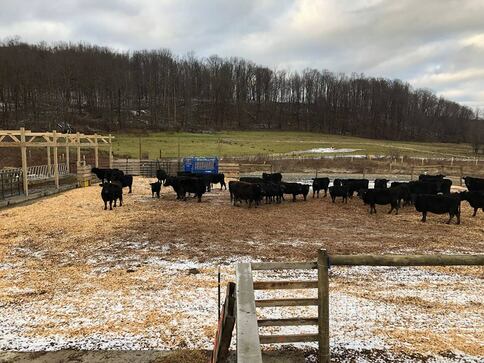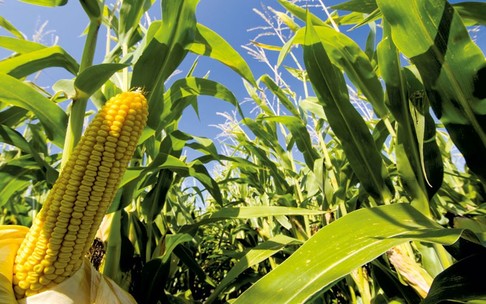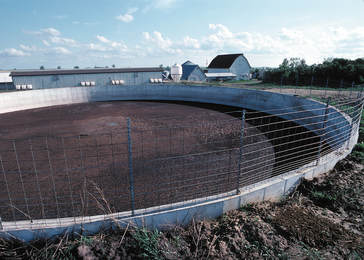Wood Chip Barnyard Open House and Conservation Field Day : April 6th @ 10:00am - 2:00pm
 Wood Chip Barnyard installed at Dewy Meadows Farm in Warren Center, Bradford County.
Wood Chip Barnyard installed at Dewy Meadows Farm in Warren Center, Bradford County.
You don’t want to miss this power packed conservation field day at Dewy Meadows Farm (grass-fed beef and maple syrup) in Warren Center, Bradford County, Pennsylvania. Four field walks will include Wood chip winter-feeding area showcase; Rotational grazing methods, management and tools; Soil health in farm fields; and Pollinator habitat and stream buffers with a live staking demonstration. Come and go, visit one or all stations as fits your schedule. Lunch includes Dewy Meadows Farm grass-fed beef BBQ and all the fixings. There is no registration or cost to attend. The event will run from 10 am until 2 pm with lunch served from 11 am – 1 pm.
Event Schedule:
The following field walks are scheduled two times each (same talk repeated). Field station leaders will be on hand throughout the day.
Wood Chip Barnyard Showcase:10:00-10:30 am and 12:00-12:30
Rob Sweppenheiser, District Engineer, Bradford County Conservation District
As an alternative to concrete, the wood chip surface underlain with drainage has been in use since January at Dewy Meadows Farm. Runoff from the lot is collected and irrigated to a vegetated treatment area in the pasture. Manure is 100% contained for field application. Learn design considerations for this system and see how it has performed through the winter.
Rotational Grazing Methods, Management and Tools:10:30-11:00am and 12:30 – 1:00 pm
John Wickham, Regional Grazing Specialist, Upper Susquehanna Coalition
How can we think differently about pasture management? What does “rotational” grazing mean? Learn how to improve pasture forage health and yield. See examples of frost seeding. Discuss methods of managing a rotational grazing system and look at some basic tools for the job.
Soil Health in Farm Fields – 11:00 – 11:30 am and 1:00 – 1:30 pm
Kevin Brown, Agricultural Resource Specialist, Bradford County Conservation District
What makes soil come alive? Is it more than water and fertilizer? Learn how to build soil, manage moisture, utilize existing nutrients, and increase yield. Learn how you can encourage soil biology to do a lot of work for you.
Pollinator Habitat and Stream Buffers – 11:30 – noon and 1:30 – 2:00 pm
Chad Spencer, Soil Conservationist, Natural Resources Conservation Service
Don’t overlook the value of plant and wildlife diversity on your property. Pollinators do more work than many of us realize. Learn about the value of pollinator habitat in field borders and stream buffers. Discuss strategic value of stream side areas and learn practical tips for managing them. Chad will lead a live staking demonstration to show how you can use cuttings from native trees and shrubs to quickly plant valuable trees in wet areas.
Financial Support for this event is provided in part by the Pennsylvania Association of Conservation Districts, Inc. through a grant from the Pennsylvania Department of Environmental Protection under Section 319 of the Clean Water Act, administered by the U.S. Environmental Protection Agency.
Event Schedule:
The following field walks are scheduled two times each (same talk repeated). Field station leaders will be on hand throughout the day.
Wood Chip Barnyard Showcase:10:00-10:30 am and 12:00-12:30
Rob Sweppenheiser, District Engineer, Bradford County Conservation District
As an alternative to concrete, the wood chip surface underlain with drainage has been in use since January at Dewy Meadows Farm. Runoff from the lot is collected and irrigated to a vegetated treatment area in the pasture. Manure is 100% contained for field application. Learn design considerations for this system and see how it has performed through the winter.
Rotational Grazing Methods, Management and Tools:10:30-11:00am and 12:30 – 1:00 pm
John Wickham, Regional Grazing Specialist, Upper Susquehanna Coalition
How can we think differently about pasture management? What does “rotational” grazing mean? Learn how to improve pasture forage health and yield. See examples of frost seeding. Discuss methods of managing a rotational grazing system and look at some basic tools for the job.
Soil Health in Farm Fields – 11:00 – 11:30 am and 1:00 – 1:30 pm
Kevin Brown, Agricultural Resource Specialist, Bradford County Conservation District
What makes soil come alive? Is it more than water and fertilizer? Learn how to build soil, manage moisture, utilize existing nutrients, and increase yield. Learn how you can encourage soil biology to do a lot of work for you.
Pollinator Habitat and Stream Buffers – 11:30 – noon and 1:30 – 2:00 pm
Chad Spencer, Soil Conservationist, Natural Resources Conservation Service
Don’t overlook the value of plant and wildlife diversity on your property. Pollinators do more work than many of us realize. Learn about the value of pollinator habitat in field borders and stream buffers. Discuss strategic value of stream side areas and learn practical tips for managing them. Chad will lead a live staking demonstration to show how you can use cuttings from native trees and shrubs to quickly plant valuable trees in wet areas.
Financial Support for this event is provided in part by the Pennsylvania Association of Conservation Districts, Inc. through a grant from the Pennsylvania Department of Environmental Protection under Section 319 of the Clean Water Act, administered by the U.S. Environmental Protection Agency.
High Clearance Interseeder
A program of the Bradford, Lycoming, Sullivan, Susquehanna, Tioga, and Wyoming County Conservation Districts.
Introducing the High Clearance Cover Crop Interseeder - broadcasting cover crop seed beneath the canopy of standing corn or soybeans. Using an air delivery system, seed is broadcast through drop tubes, covering 90 feet with one pass. Cover crops can be started during those valuable, late-summer growing days while you prepare to harvest, giving your cover crop the jump it needs.
In 2018, the interseeder will be operating in the Pennsylvania Counties of Bradford, Lycoming, Sullivan, Susquehanna, Tioga and Wyoming, and anywhere else within reach. Contact your conservation district for more details. The schedule will fill up fast, so TELL US of your interest today.
Introducing the High Clearance Cover Crop Interseeder - broadcasting cover crop seed beneath the canopy of standing corn or soybeans. Using an air delivery system, seed is broadcast through drop tubes, covering 90 feet with one pass. Cover crops can be started during those valuable, late-summer growing days while you prepare to harvest, giving your cover crop the jump it needs.
In 2018, the interseeder will be operating in the Pennsylvania Counties of Bradford, Lycoming, Sullivan, Susquehanna, Tioga and Wyoming, and anywhere else within reach. Contact your conservation district for more details. The schedule will fill up fast, so TELL US of your interest today.
|
What is it?
A high clearance sprayer unit that is equipped for air seeding cover crop into a growing row crop 90 foot booms will cover 36 rows with each pass (30 inch spacing) 15 inch wide tires and 6 foot high clearance, NO CROP TOO TALL! When is it used? After corn crop is too tall for other methods of cover crop seeding In crops harvested too late to get a good cover crop established In a typical growing season, it will start in standing corn in mid-August Soybeans will start in September, before leaf drop Why use it? Cover crop seed can be placed between rows of a growing crop The earlier the seeding, the more growth you get before frost and winter Opportunity to establish a cover crop in late harvested grain corn and soybean fields How does it work? Air seeding system places seed between rows and beneath crop canopy In full size corn, the stalk will bend as the machine passes over then stand back up What does it cost? $15 per acre plus the cost of seed May require deposit toward seed cost Seed Options: We will coordinate delivery of 2 seed options Single species annual ryegrass Mix of cereal rye, clover, vetch and radish Who drives it? We will provide an operator and coordinate seed, fuel, and equipment maintenance Farmer may be asked to help move tote of bulk seed or transport operator to the next farm How do I sign up? Call your County Conservation District representative: Carrie Richmond or Gloria Norcross at 570-928-7057 Fill out the online form For additional information, photos, and videos: www.bccdpa.com/interseeder |
|
Agriculture in Sullivan County

Agriculture is a very important part of Sullivan County. It is still the number one industry in Sullivan County. Sullivan County is also very fortunate to have great water quality flowing down its streams. Almost every stream in the county is either High Quality (HQ) or Exceptional Value (EV). It is the results of our biggest land user, agriculture, and the goals of doing things right that allow the county to have viable industry and a clean environment.
Being a part of agriculture in Sullivan County means being a good steward to the land and our natural resources. By being a good steward, it is important to meet all regulatory requirements of sound nutrient, soil, and water management.
Sullivan County finds itself in the Chesapeake Bay Watershed and is required to meet expectations and goals of proper management practices to do it’s part to substantially decrease the nutrient and sedimentation pollution to the Bay. Pennsylvania has recently amended its Chapter 102 Soil Erosion and Sedimentation Control regulations (2010) and its Manure Management Manual (2011). These regulations are statewide and compliance with the minimum requirements is something all farms in Pennsylvania, regardless of size, must do. Manure Management requirements have been in existence since 1993. The management of soil erosion and sedimentation has been a requirement since 1972. Neither is new to Pennsylvania however, for most agricultural operations, it has been voluntary and many do not have the written verification as to how and where practices are occurring.
Being a part of agriculture in Sullivan County means being a good steward to the land and our natural resources. By being a good steward, it is important to meet all regulatory requirements of sound nutrient, soil, and water management.
Sullivan County finds itself in the Chesapeake Bay Watershed and is required to meet expectations and goals of proper management practices to do it’s part to substantially decrease the nutrient and sedimentation pollution to the Bay. Pennsylvania has recently amended its Chapter 102 Soil Erosion and Sedimentation Control regulations (2010) and its Manure Management Manual (2011). These regulations are statewide and compliance with the minimum requirements is something all farms in Pennsylvania, regardless of size, must do. Manure Management requirements have been in existence since 1993. The management of soil erosion and sedimentation has been a requirement since 1972. Neither is new to Pennsylvania however, for most agricultural operations, it has been voluntary and many do not have the written verification as to how and where practices are occurring.
Manure Management Plans

All Pennsylvania farms that produce manure are required to, at minimum, have a manure management plan that addresses the production and use of the manure nutrients. The plan also addresses pasture management practices, winter application of manure, manure storage and/or stockpiling, and animal concentration areas. Farmers can choose to develop their own manure management plan, work with district technical staff to develop a plan or work with certified nutrient management plan writers to develop voluntary nutrient management plans that are more flexible towards management variances. A manure management plan is an acceptable plan under Pennsylvania regulations if the operation has less than 2 animal equivalent units (AEUs) per acre of crop/pasture ground. If an operation exceeds 2 AEUs/acre, a manure management plan is not feasible and the operator must have an Act 38 Nutrient Management Plan developed. To determine AEUs/acre for your operation, refer to the calculations below.
Manure management plans are relatively simple to complete and provide the operator with written documentation to how the farm is operated in regards to the number of animals, the crop and pasture acres, and the handling of manure nutrients. By developing and maintaining a manure management plan, operators are meeting minimum compliance to state and federal rules and regulations of agriculture.
Manure management plans are relatively simple to complete and provide the operator with written documentation to how the farm is operated in regards to the number of animals, the crop and pasture acres, and the handling of manure nutrients. By developing and maintaining a manure management plan, operators are meeting minimum compliance to state and federal rules and regulations of agriculture.
Agriculture Erosion and Sedimentation Plans
Farms that till ground for crop production and/or exceed 5,000 square feet of earth disturbance are required to also have a written agricultural soil erosion and sedimentation plan that identifies fields, erosion potential areas, and practices being utilized and/or needed to minimize the soil loss. These plans must take into account all crop land and farmstead issues including roof run-off, animal heavy use areas, animal concentration areas, tillage of crop fields and surface water controls to keep clean water clean.
